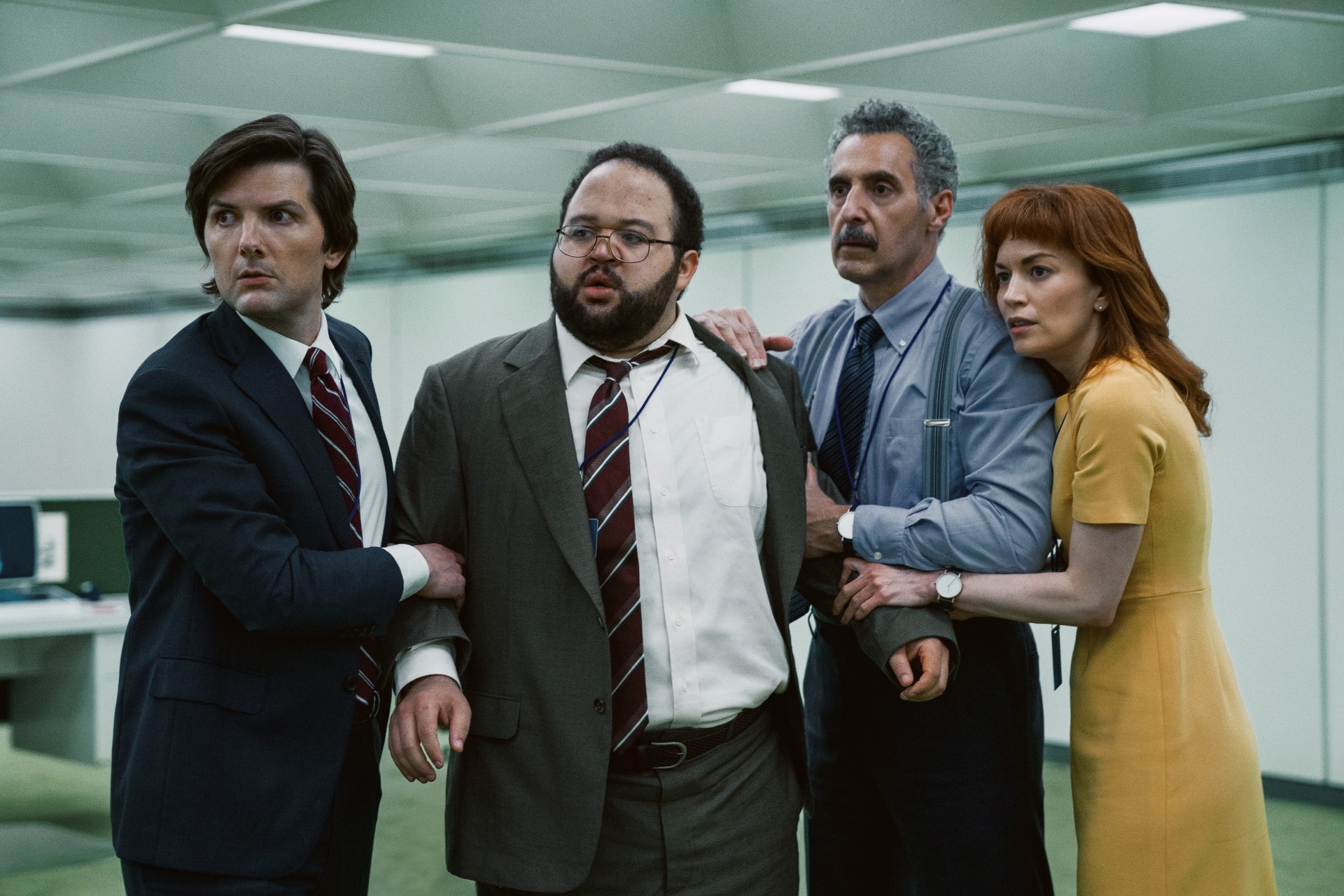Severance gave me an existential crisis in the best way
The Apple TV Plus sci-fi thriller is an anti-capitalist love letter to the mundane things that make us human

I can’t remember the last time a show made me pause, take inventory of my life and surroundings, and ask myself, "Are you happy?" And while that might sound a little grim, it’s a marker of a great story, great execution, and an important show – one that has the power to change our perspective and steer us in a better direction.
Severance, on the surface, seems like The Office meets Twilight Zone: a series set in the not-so-distant future in which people have the option to get 'severed', a special procedure that allows them to separate their work self from their regular self, creating a paradox where your "innie" and "outie" live separate lives and don’t actually know each other. But beneath the office's waffle parties, hidden rainbow lights in the ceiling, and jazz dance breaks, something much darker lurks.
Mark (Adam Scott) decides to get severed after his wife dies, seemingly as a way to cope. We don’t really know why his other coworkers decide to get severed, but we start to infer that the people who do get severed are missing something and searching for a purpose. "It’s really been helping me," his outie says at one point early on. Many people in Mark’s life, and the viewer at home, struggle to figure out why anyone would want to get severed. And the more the show exposes the dystopian nature of the office space, including the legalized torture (because no one outside of work would remember it so there are no consequences) and constant yearning for any semblance of the outside, the more being severed seems like the worst thing in the world. Who on earth would actually want to do that?
Well, me. If you had asked me in 2016 if I wanted to get severed, I would have done it in a heartbeat. At the time, during a previous job, I was assaulted by a colleague. This began to bleed into my "normal" life and I took work home every single day, to the point where it affected my mornings and nights and weekends in such a way that I was looking for any kind of quick fix to relieve me of my misery. Like the employees of Lumon’s severed floor, I, too, was frequently let down by my superiors – the ones who claimed to have my best interest in mind. The idea of keeping both completely separate, of being able to go home and sleep well because I had no recollection of what horrors went on during my work day... that sounds awesome, honestly. The concept of giving up your bodily autonomy in exchange for some manufactured version of freedom is, well, from an ethical standpoint, terrible. But when you’re miserable and desperate and need a way out, it doesn’t sound too bad.
At the San Diego Comic-Con, I went on a Severance experience in which my innie was given a different name to my own, and I sat at those same sterile desks and scrolled through meaningless numerical lists in order to "find the scary numbers." I even used little Lumon coins to get pretzels from a vending machine and had a "Defiant Jazz" dance break.
I absolutely loved it, and I knew right then and there that my 2016 self would have immediately conformed and maybe, like Irving (John Turturro) or Ms. Casey (Dichen Lachman), became dedicated to the company and workplace in a way that almost seems comical or unnatural – because what else is there? I would have romanticized every single dystopian detail about that place, right down to praising the founder and CEO of Lumon because hey, maybe he had the right idea after all. We all want to be Helly R. (Britt Lower), or at least we think we’d be like Helly R. We watch the show and think, "Yeah! Look at her being the only person on the entire floor who realizes that something is very, very wrong here." But I think, in my mission to cope, my innie would decline to question anything. My innie would conform.
After being briefly transported back to one of the worst periods of my life while watching this show, I was then forced to take a look around at my own life. Is anyone on Severance truly happy? It doesn’t seem that way, even the ones who aren’t severed but are forced to live among the severed in a world that doesn’t make all that much sense. It’s when Mark, who is still grieving the passing of his wife, gets drunk and rips up her photo in front of his date, in order to "prove" that he’s "over her." For eight hours a day, Monday through Friday, he doesn’t know that he has a wife. But when he gets home, he’s hit with the reality of it all over again. The severance process is a distraction, and a harmful one at that.
Sign up for the Total Film Newsletter
Bringing all the latest movie news, features, and reviews to your inbox
I watch Severance and I think about my family, my relationships, my apartment, my job, my cats, my shitty car, my health, my age, my country, and I wonder if I’m happy. I am, I think. But I look at this world that Dan Erickson and Ben Stiller have so carefully created, look at the way Devon (Jen Tullock) struggles to understand her brother Mark’s decision, see how scared Alexa (Nikki M. James) was of him at such a vulnerable moment, and even look at the way Mrs. Selvig lives and dies for Lumon (to the point where she keeps a shrine of Kier in her living room), and wonder if there’s something missing.
Severance is available on Apple TV Plus now. For more on the series, check out our deep-dive into the Severance ending in which we answer some of your biggest questions about the show.

Lauren Milici is a Senior Entertainment Writer for GamesRadar+ currently based in the Midwest. She previously reported on breaking news for The Independent's Indy100 and created TV and film listicles for Ranker. Her work has been published in Fandom, Nerdist, Paste Magazine, Vulture, PopSugar, Fangoria, and more.


